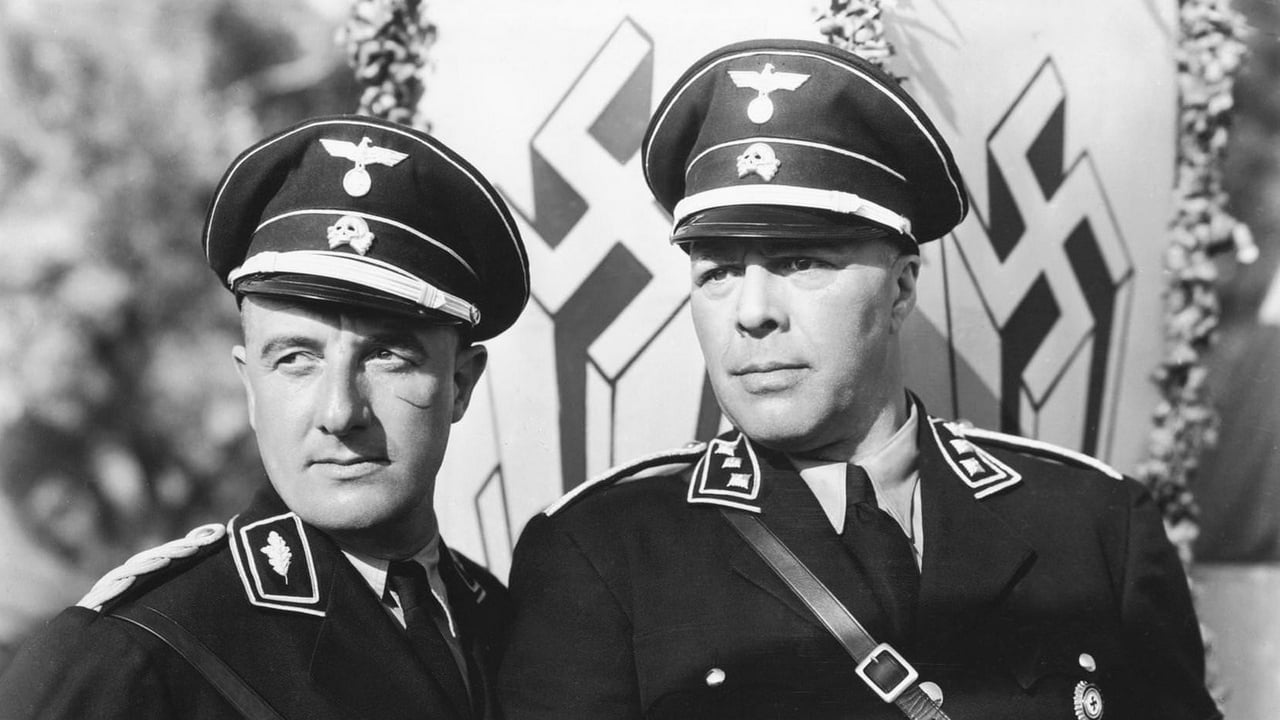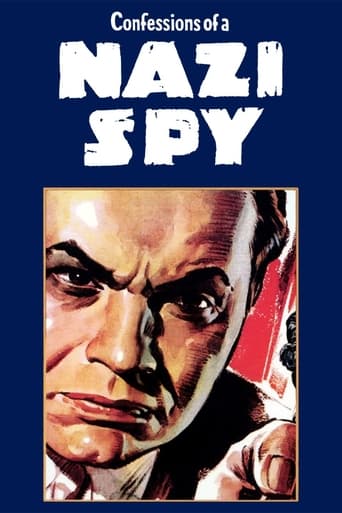Beystiman
It's fun, it's light, [but] it has a hard time when its tries to get heavy.
Doomtomylo
a film so unique, intoxicating and bizarre that it not only demands another viewing, but is also forgivable as a satirical comedy where the jokes eventually take the back seat.
Lela
The tone of this movie is interesting -- the stakes are both dramatic and high, but it's balanced with a lot of fun, tongue and cheek dialogue.
Jenni Devyn
Worth seeing just to witness how winsome it is.
LeonLouisRicci
Historically Important and Riveting Rally the Citizenry Film from Stylish Director Anatole Litvak and Warner Brothers Studio. It was the First Hollywood Exploration of Contemporary World Events Concerning Germany's War Machine and its Megalomaniacal Leader, and a Real Life Spy Ring that the F.B.I. Took On and Succeeded to Expose and Convict.The War Clouds in Europe at the Time were Dark and Sinister and it was Becoming Almost a Certainty that America Would Become Involved in this Global Nightmare, Despite the Isolationist Sentiments as a Result of WWI. A Hefty Majority of American Citizens were Against Involvement in the Overseas Conflicts Prior to Pearl Harbor.This is a Gripping and Expertly Done Film that Ignites the Screen. It is Fiery Rhetoric and Propaganda Designed to Wake Up the Sleeping Americans. It is So Well Done that it Succeeds as Both Social Commentary and Entertainment.A Good Cast Uniformly Delivers Believable Performances and None Go Over the Top. But the Highlight of the Movie is the Visual Template. Stunning and Scary Sets Combine with Searing Montage that Uses All Types of Cinematic Flourishes that Keep the Viewer on Edge Between the Dramatic Scenes.Overall, this is Compelling Movie Making and Utilizes All the Tricks of the Trade to Make This Into One of the Most Interesting Films About the Early Years Prior to WWII.
classicsoncall
I'd never heard of this film but when I saw it in the cable lineup for Turner Classics this morning I had to be there, especially with Edgar G. Robinson heading the cast. Interestingly, Robinson doesn't even appear until about half way into the picture as an FBI agent hot on the trail of a German-American turned Nazi spy. I have to admit, there were times the story got pretty chilling for me the way it portrayed Nazi infiltration into American daily life look so easy to do. The blind obedience to Adolph Hitler professed by Dr. Karl Kassel (Paul Lukas) in his speeches to local bund gatherings is somewhat hard to imagine today, but then again, I've seen era footage of a Hitler rally in Madison Square Garden, so I have to believe this wouldn't have been impossible.What I thought was pretty cool was the way Agent Renard (Robinson) got Kurt Schneider (Francis Lederer) to crack, playing to his vanity and sense of self importance. No doubt the job was made easier by Schneider's inability to make his spy activities pay off in a big way with his German contact Schlager (George Sanders). It's also noteworthy to mention how Germans in the film reacted in horror to the mere mention of the word 'Gestapo'; every time it was uttered it brought on a near panic attack.I'm really curious how this film was received back when first released. Gallup polls taken in 1936 showed that only one in twenty Americans were in favor of America getting involved in another war, but it took only two more years of Hitler's aggression to convince Americans that strengthening our Armed Forces for a conflict would be in our best interest. In perhaps the best line of dialog that would preview America's eventual entry into World War II, Attorney Kellogg (Henry O'Neill) states his considered view to Agent Renard that "When our basic liberties are threatened, we wake up."
Michael_Elliott
Confessions of a Nazi Spy (1939) *** (out of 4) Better than expected propaganda film from Warner is probably more historically interesting than entertaining but there's still enough good stuff here to make it stand up well in today's times. The film centers on an FBI agent (Edward G. Robinson) who is trying to track down and break a Nazi ring working inside the United States. Watching this film today the subject matter is rather heavily handled and preachy. I'd go even further to say that the director and screenwriter are constantly beating their subjected over the head of the viewer but one has to remember that the Nazi movements in America were pretty much kept quiet back in the day and this film bravely threw them under the bus a few times. One has to applaud the film for trying what it did in 1939 and I'm sure the movie opened the eyes of many people (even though I've heard it wasn't a hit for the studio). The story told here is a pretty good one that will certainly grab your attention and keep you going throughout the film. The documentary-style telling doesn't work overly well but that doesn't matter too much. Robinson turns in a good, quiet performance as the main FBI guy. He doesn't shout or get too worked up, which is something I haven't seen from him in his earlier films. I really enjoyed how Robinson played the character and it really paid off in the end. Francis Lederer, George Sanders, Paul Lukas, Henry O'Neill and Joe Sawyer add nice supporting performances.
Rumjal
Those who would comment upon the film "Confessions of a Nazi Spy"--and many other Warner Brothers films--would do well to see director Richard Schickel's five-hour film "You Must Remember This: The Warner Bros. Story" and the book that accompanies the film, both of which were created as the centerpiece of a celebration of the studio's 85th anniversary (more information on this series is available on the PBS website under the series American Masters).While "Confessions of a Nazi Spy" is seen as mild in its view of the Third Reich today, it was the first anti-Nazi film produced by any studio and was so controversial in its day that the studio was to be prosecuted for making the film and would have been prosecuted had the Empire of Japan not attacked Pearl Harbor two weeks before the prosecution was to begin.

